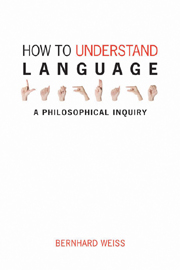Book contents
- Frontmatter
- Contents
- Preface
- 1 The puzzles of language
- 2 The starting-point for analysis
- 3 Analysing sentence-meaning
- 4 Analysing synonymy
- 5 Radical translation
- 6 The structure of a theory of meaning
- 7 Radical interpretation
- 8 Linguistic norms, communication and radical interpretation
- 9 Linguistic normativity
- 10 Radical or robust?
- 11 Language and community
- 12 Rules and privacy: the problem
- 13 Rules and privacy: the solution?
- 14 Truth-conditions versus use-conditions
- Notes
- Bibliography
- Index
13 - Rules and privacy: the solution?
- Frontmatter
- Contents
- Preface
- 1 The puzzles of language
- 2 The starting-point for analysis
- 3 Analysing sentence-meaning
- 4 Analysing synonymy
- 5 Radical translation
- 6 The structure of a theory of meaning
- 7 Radical interpretation
- 8 Linguistic norms, communication and radical interpretation
- 9 Linguistic normativity
- 10 Radical or robust?
- 11 Language and community
- 12 Rules and privacy: the problem
- 13 Rules and privacy: the solution?
- 14 Truth-conditions versus use-conditions
- Notes
- Bibliography
- Index
Summary
Can there be a private language?
At §201 – quoted above – Wittgenstein (1958) draws the paradoxical conclusion from his previous meditation on following a rule and then goes on to diagnose the error. The solution requires us to make two moves: first, to reject the view that grasping a rule is always a matter of having an interpretation and, secondly, to accept that there is a way of grasping a rule that is exhibited in calling particular uses either “obeying the rule” or “going against the rule”. I want to focus first on the second, positive, movement. As we noted, Wittgenstein does not respond to the rule-following paradox by offering an account of what it is to follow a rule; rather, he says that there is a way of grasping a rule that is exhibited in what we call accord and discord. We thus discover not what rule-following is but an essential condition for there to be rule-following. That essential condition is that there must be a practice of regulating our practice; there is no mere practice of following a rule since, for there to be such a practice, there must also be a “second-order” practice of policing the practice. So rule-following is necessarily a reflective activity; rule-followers must engage not only in the practice of following a rule but in the practice of assessing performances as either in accord or in conflict with the rule: “Hence it is not possible to obey a rule ‘privately’: otherwise thinking one was obeying a rule would be the same thing as obeying it” (ibid.: § 201).
- Type
- Chapter
- Information
- How to Understand LanguageA Philosophical Inquiry, pp. 201 - 230Publisher: Acumen PublishingPrint publication year: 2009



